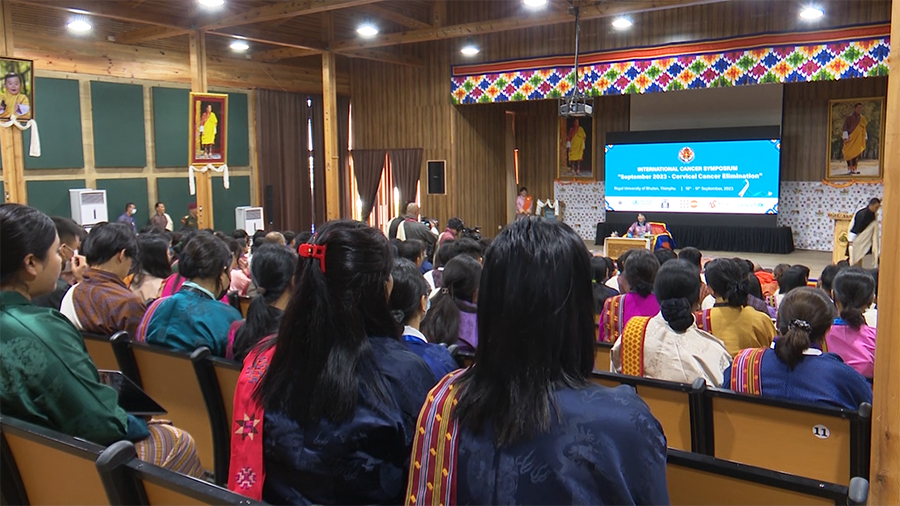
Stories of cancer survivors filled the hall of the Royal University of Bhutan during the two-day International Cancer Symposium. On the final day, Her Majesty the Queen Mother, Tseyring Pem Wangchuck also shared Her Majesty’s cancer journey. Her Majesty emphasised that cancer can affect anyone, regardless of age, ethnicity and financial status and it is preventable. The symposium in the capital concluded yesterday.
Her Majesty was diagnosed with cancer in 2017 and started her treatment in 2019. The participants of the Symposium had the honour of listening to Her Majesty’s experience as a cancer survivor.
“When my doctor told me that I had cancer, you know it was a numbing experience. And everyone just kept telling me, you are so strong, you are so brave. But inwardly you go through a lot of trauma. You know the emotional, the mental, the physical pain and the struggle that you have to go through. Not outwardly, it is mostly within, which you try to hide actually. You don’t want to show people that you are weak. Family means so much, family’s support and the love, the care is vital, is important when you are going through this.”
Her Majesty emphasised the importance of incorporating alternative healing into treatment plans as it enhances the overall experience.
“I believe that with chemotherapy, immunotherapy, and radiation, you need to combine with alternative healing. It makes it so much better. I would advise everyone who is taking cancer treatment to go for alternative healing.”
Concluding the address, Her Majesty shared words of hope and resilience.
“Be brave! And we all have to realise that there is nothing wrong with your hair falling. There is nothing wrong with having cancer. There is life beyond cancer. And that is the time I learned we need to appreciate life. And try to treasure every moment. My love, my support in every way is there for you.”
The Symposium also featured stories from a few cervical cancer survivors who shared their own journeys to recovery.
“I underwent a medical procedure twice. For the first, I stayed for three and a half months abroad. For the second, I stayed abroad for three months and had a really hard time when I came back. Now, I am healthy,” said Ugyen, a cancer Survivor.
Similarly, Bhotu Man Darjee, whose wife battled cervical cancer emphasised the importance of early detection and treatment. Bhutan has committed to eliminate cervical cancer by 2030.
“She was diagnosed with cervical cancer when doctors came to our village for screening. My wife already had high blood pressure and diabetes. So, Doctor Ugyen Tshomo referred us to India for her treatment,” said Bhotu Man Darjee, husband of a Cancer Survivor.
Five years ago, the couple left their village in Samtse for treatment and they are still living in the capital in the hope of living a cancer-free life.
Likewise, 40-year-old Dechen Zangmo cancer survivor stressed the importance of early detection and screening.
“It is important to do a pap smear test. Rather than being embarrassed, doing a frequent pap smear test will benefit us. We should not be ashamed and scared because it is important to do tests that will help prevent cancer.”
These cancer survivors descend from different walks of life but they all had a common message: that there is hope and life for those currently fighting cancer.
According to the health ministry, timely screening, testing and checkups are necessary to combat cancer.
Devika Pradhan & Singye Dema
Edited by Sonam Pem








